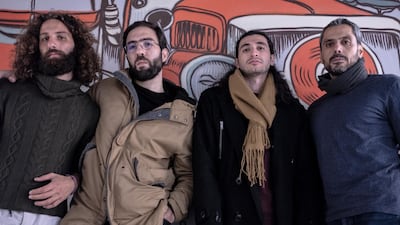This weekend, get ready to party like it's 2009 at the Abu Dhabi Cultural Foundation. The venue at Qasr Al Hosn will host two concerts featuring bands that helped to form the Arabic independent rock music scene a decade ago, as part of the Haysa concert series.
Tonight will be an all-Jordanian affair, with El Morabba3, El Far3i and Harget Kart performing in a show starting at 7pm. Tomorrow night, popular Lebanese quartet Adonis will take to the stage, supported by up-and-coming Palestinian group Ens O Jam, with the event running from 7pm until 9pm.
The event chronology is spot on, as it is bands such as El Morabba3 and El Far3i that inspired Adonis to compose rock tunes in the Arabic language. Tonight's bill also demonstrates how Jordan was at the centre of the Arabic indie rock explosion at the turn of the previous decade, with plenty of bands, such as Autostrad and Jadal, also going on to forge solid careers in the industry.
El Morabba3 singer and band leader Muhammad Abdullah has a few theories about why the kingdom continues to punch above its weight in the rock scene. "My take on this is Jordan is a small country and our fingerprints are not found in the cultural mainstream – that was more for artists from Egypt and Lebanon," he says. "But when it comes to independent music, we always do well as we are a relatively new country in the Arab world and we, as artists, are not lifting the weight of too much history."
That freedom, Abdullah says, resulted in a lot of young aspiring musicians picking up guitars and listening to grooves recorded by bands from the West. "A lot of bands from that time began as friends just jamming together," he says. "El Morabba3 came from that environment, in that we were as much musicians as fans."
It is that quality that allowed the collective – Abdullah is the only constant member in a revolving cast of musicians to record and perform as El Morabba3 – to tap into what youths in the region really wanted. That was a new and vibrant Arabic sound that tackled issues relevant to their audience.
The band distilled these elements into their seminal self-titled debut album, which was released in 2012, a record that discussed issues such as nationalism and the class divide over quirky post-rock rhythms.
“The album remains special to me,” Abdullah says. “I associate it with what was happening at the time in the Arab world – where there was this thirst for new musical expression – and us going to the studio and recording what we felt. There was a real purity to that process. It was something that I couldn’t recreate on the second album.”
And that's because Abdullah decided to mix things up. His group's 2016 album, Taraf Al Khait, is a more challenging listen than the earlier release due to the new electronic music elements added to the mix and the more progressive songwriting.
"The aim of the album was to experiment," he says. "With new musical technology, I felt we had a large new space and colours that we could play with. It also required more work and intensity, which is one of the reasons why it wasn't as enjoyable to record as the first."
The album was another case of good timing for El Morabba3. With the advent of streaming sites taking their music way beyond the region, the band began to tour in Europe.
Abdullah also credits social media and streaming services with helping Arab groups resist the urge to sing in another language to ensure they broke out of the region. "Technology allowed us to take the music far and wide," he says. "And, you know, there is always going to be a large Arabic community living in each major city in Europe, so we can tour there, play to them and maintain our identity."
While El Morabba3 will mostly perform fan favourites at tonight's Abu Dhabi show, Abdullah says he plans to head back to his home studio in Amman this year to record new tunes. He credits that sense of certainty to El Morabba3's collective model. Such a set-up has maintained the group's longevity.
"Other bands from our time couldn't really go on because various members went through life circumstances," he says. "Doing it this way gives the project a sense of stability. There are also benefits on the creative level when working with new musicians and producers, in that I am always playing with new ideas."
El Morabba3 will perform at the Abu Dhabi Cultural Foundation, Qasr Al Hosn, tonight. More information is available at www.culturalfoundation.ae


